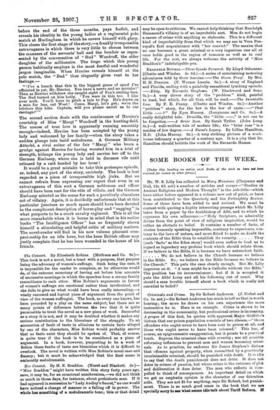The Convert. By Elizabeth Robins. (Methuen and Co. 6s.)— This
book is not a novel, but a tract with a purpose, that purpose being the advocacy of women's suffrage. Such being the case, it is impossible for the reader to complain, as ho otherwise would do, of the extreme monotony of having set before him accounts of successive meetings in which the speeches bear a strong family resemblance to each other. Miss Robins's arguments in favour of women's suffrage are emotional rather than intellectual, and she fails to give us what would have been really interesting,—a wisely reasoned and logical piece of argument from the point of view of the woman suffragist. The book, as every one knows, has been preceded by a play on the same subject, but there are so many points of difference between the two that it is quite permissible to treat the novel as a new piece of work. Successful as a story it is not, and it may be doubted whether it makes any serious contribution to the literature of the struggle. To an accusation of fault of taste in allusions to certain facts alleged by one of the characters, Miss Robins would probably answer that as facts exist they should be spoken of. That, of course, is quite true if the book is to be considered as a piece of argument. In a book, however, purporting to be a work of fiction these faults of taste are blemishes which it is difficult to overlook. The novel is written with Miss Robins's usual ease and fluency; but it must be acknowledged that the final scene is eminently melodramatic.


















































 Previous page
Previous page